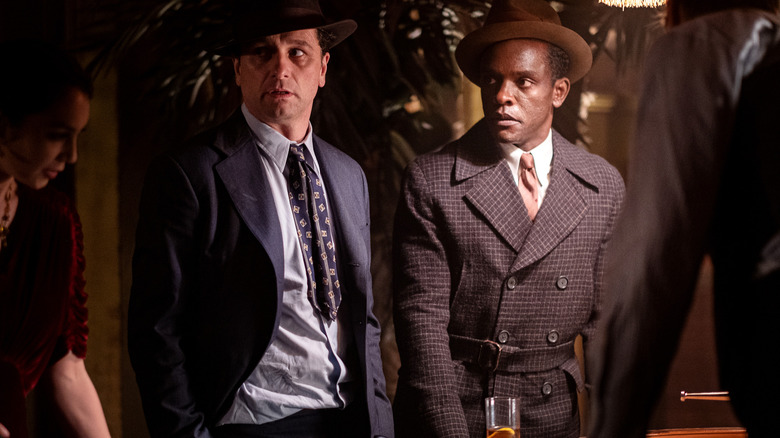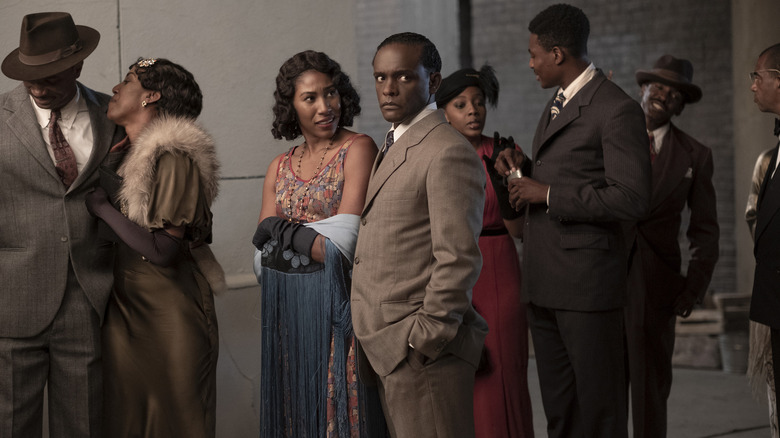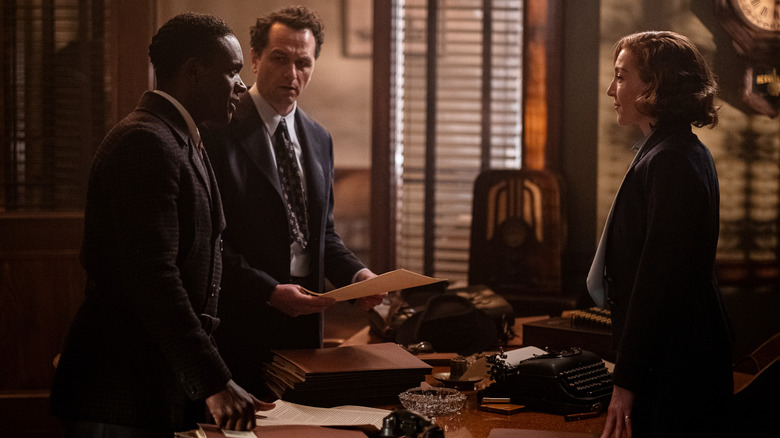Perry Mason's Chris Chalk Identifies Paul Drake's Turning Point
This article contains spoilers up to the latest episode of season 2 of "Perry Mason."
When the debut season of HBO's "Perry Mason" came to an end in 2020, the requisite origin story was finally out of the way and our trio of heroes — Matthew Rhys' criminal defense lawyer Perry Mason, his secretary-turned-attorney Della Street (Juliet Rylance), and investigator Paul Drake (Chris Chalk) — had formed a strong unit for their fledgling legal team. Season 2, however, started on a completely different note. (You can read /Film's review by Chris Evangelista here.) Instead of criminal law, Mason had shifted gears to the much less stressful (and less triggering) pastures of civil law. And without any real boots-on-the-ground work to keep him paying the bills, the ever-resourceful Drake had largely gone his own separate way.
As the season progressed, however, Mason and Street couldn't help but throw themselves at another un-winnable criminal case, and Drake soon found himself once again at their sides, rolling up his sleeves, and doing the dirty work to help uncover the evidence the attorneys need to absolve two young Mexican boys of the murder of a famous (and corrupt) public servant. The deeper and deeper that our trio dig into the case, however, the more and more their personal demons come to the forefront.
For Paul's emotional arc, that means something completely different than most of the rest of the cast: dealing with putting bread on the table, his own self-doubt, and the virulent racism and ever-present reminder of what it's like to live as a Black man in the U.S.
The turning point
Having been let down repeatedly by white people like deceptive investigator Pete Strickland (Shea Whigham) and even the well-intentioned Mason himself, Paul Drake's cynicism feels completely natural. With Mason no longer providing steady work as he implicitly promised, Drake resorted to a freelance gig with Strickland ... who in turn proceeded to indirectly stab him in the back, using the evidence to arrest a local gangster who had been providing a surprisingly high quality of life for the local Black community.
In an interview with EURweb, Chris Chalk identified the crucial moment when Drake reached his personal crossroads in season 2. It came about towards the end of the fourth episode, after uncovering evidence that indicates their defendants actually did murder wealthy Los Angeles public figure Brooks McCutcheon (Tommy Dewey). Suffering a crisis of conscience over what to do, he turns to his unwaveringly determined wife Clara (Diarra Kilpatrick) for a much-needed pep talk where she simply challenges him to do his job as an investigator and find more evidence. According to Chalk, this was the difference-maker for Drake:
"I think more so than Perry, like you said, it's Clara that gets Paul to get his s**t together. Clara has a moment where she says, 'You know, if you don't like it, do something about it.' And I take that as Paul's turning point, because he's tried, he's been knocking on these white doors when he was a regular cop, a beat cop."
Since those early days on the beat in season 1, Drake and Mason have butted heads over racial issues that Mason remained ignorant of — even without acting out of outright malice. But in some ways, that only makes it worse.
The Perry problem
Even before Drake was compelled to put a beatdown on a young Black kid at the direction of local gangster Melvin Perkins (Christopher Carrington), leading to a bit of a haunting subplot involving those distinctive bloody sneakers, Drake had been struggling profoundly with how to balance his morals with his duties as an investigator. Complicating matters was the fact that he couldn't quite bring himself to completely trust in Mason. Later in the same interview, Chris Chalk explained his character's mindset with regards to the show's troubled, flawed, but ultimately good-hearted main lead:
"And so Perry represents a guy who, sure, Perry has great intentions, but intentions and follow-through, you know, especially as a white dude in the '30s — I don't expect much from him. I expect bare minimum and he barely meets that qualification. I think we have a hard time this season with finding what it means for a white dude in the '30s to be generous to anybody but himself. I mean, we look back at the past and we forget how savage they were. We're savage now. So imagine back then when [the N-word] was just, you could say it and black people would answer [laughs]."
The actor certainly has a great point in that, as much as the series reflects our own modern shortcomings, Los Angeles in the 1930s was a breeding ground for even worse race relations. But lest we place too much of history's failings on Mason's shoulders alone, Chalk clarified, "Something about Perry Mason does inspire Paul because he really is trying, he's just such a mess, but he really is trying to be a good dude."
We'll see where Drake ends up as "Perry Mason" streams its final 2 episodes tonight and next Monday on Max.


